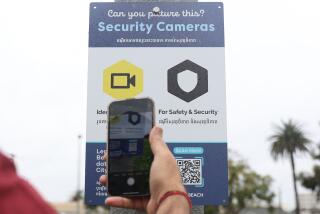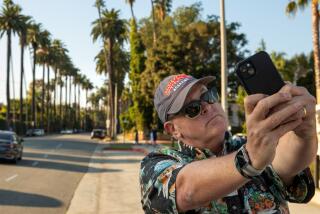Google Maps redraw the realm of privacy
- Share via
Google Inc. has been watching you, Southern California.
A caravan of cars and trucks mounted with cameras has been driving city streets for months, snapping close-up photographs of homes, shops and public places.
Any people who got in the way became subjects in Google’s version of “Candid Camera.”
The Internet company late Monday began incorporating street-level photos from Los Angeles, San Diego and some Orange County cities into its Google Maps program. The additions expanded an online service that thrilled some digital-map buffs and freaked out privacy advocates when it launched in May in the San Francisco Bay Area, New York and three other cities.
The photos can help people scout out places they plan to visit. But when Google’s camera shutters click, they capture more than buildings.
Within hours of the first release, bloggers had found and posted photographs -- which are often sharp enough to identify the people in them -- of vulnerable moments: students sunbathing in bikinis at Stanford University, motorists being ticketed by police, a man walking into an adult bookstore in Oakland, even a man picking his nose on a San Jose park bench.
In Los Angeles, it could create a new sport: celebrity hunting on Google Maps.
“It is a visual reminder of how our private spaces are really shrinking,” said Pam Dixon, executive director of the World Privacy Forum, a San Diego advocacy group. “We’ve never had the expectation of privacy in public places, but it’s the technology that causes us to reexamine this. Computers have very long memories.”
The so-called Street View program is part of Google’s effort to organize all the world’s information, including visual data about the planet on which we live.
In Los Angeles, Google trucks have photographed major thoroughfares from Santa Monica to downtown. Street View also now covers parts of Anaheim, Long Beach, Newport Beach, Huntington Beach, Laguna Niguel and San Diego. Other cities included in Monday’s expansion were Houston and Orlando, Fla.
Google users can find the photos by entering addresses into maps.google.com, then clicking on the “Street View” button.
Google, based in Mountain View, Calif., says the pictures are useful. Real estate shoppers can inspect homes and neighborhoods. Diners can see a restaurant’s location on a block. Friends can pinpoint a meeting place.
“I’ve used it to choose between two different hotels in New York,” said Greg Sterling, an analyst at Sterling Market Intelligence.
Said Stephen Chau, Google’s product manager for Street View, “It gives users a better understanding of a particular location.”
It’s also a source of endless amusement for some Web surfers. After Street View started, websites sprouted up that were devoted to posting the most embarrassing or interesting details.
Raw curiosity bordering on voyeurism appears to be the biggest reason people are using such services, said Forrester Research analyst Charlene Li.
Privacy lawyers say the pictures are perfectly legal.
“The law allows you to take a picture of anything you can see as long as you’re in a public place,” said Kelli Sager, a 1st Amendment lawyer with Davis Wright Tremaine in Los Angeles.
Though they don’t break new legal ground, the pictures challenge expectations of privacy.
Chau said the company would take down images if it received complaints -- it offers an online feedback tool that lets user report “inappropriate” images, including ones that create personal security concerns or violate privacy.
Some of the photos taken off the site showed nudity or people publicly urinating.
Google also said it worked with advocates of domestic violence victims to give them a “fast track” to take down photos of shelters.
The company said it received a “very small number” of requests to take down photos.
The problem is, by the time Google decides to pull down an image, it may have been irretrievably circulated on the Web.
Street View exposed a bad habit of Kevin Bankston, an attorney with the Electronic Frontier Foundation in San Francisco. Bankston, a secret smoker, had the bad luck to be caught sneaking a cigarette in a shot pointed out to him by a journalist.
After he complained, Google removed the picture.
“My life will go on,” Bankston said. “But it makes me worry about the people exiting Alcoholics Anonymous, an abortion clinic or a controversial religious or political meeting.”
Bankston and other advocates want Google to automatically blur people’s faces.
“They should build in privacy protection mechanisms as a matter of course,” said Beth Givens, director of the Privacy Rights Clearinghouse in San Diego. “I don’t see them proactively addressing the privacy implications of their various products, and they need to.”
If Google doesn’t have the tools now, advocates say, it could in short order, because software companies are working on far more complex technology for recognizing specific faces.
“The Street View issue is part of a broad trend where more and more information is taken from the public,” Bankston said. “We expect some degree of anonymity in our lives. How does one maintain a free society when all of your activity is scrutinized?”
Some privacy advocates also suggested that Google post notices saying which streets or neighborhoods it planned to target on a given day so that people averse to being photographed could steer clear.
Li, the Forrester analyst, said she didn’t expect Google to update the photographs more than once a year.
Street View could make snooping easier for stalkers and paparazzi, who could use it to tell what car a celebrity drives.
Francois Navarre of X17, one of the most aggressive celebrity photography agencies, called Street View “an interesting and useful tool” for any journalist.
joseph.menn@latimes.com






